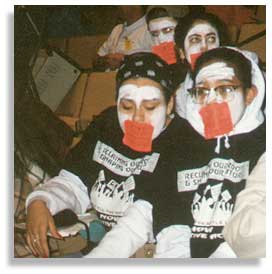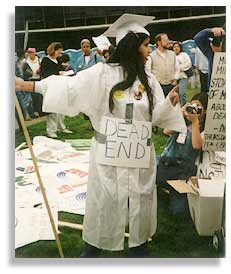|
University of California students campaign to win back affirmative action Oakland, California
In Motion Magazine: What is the current diversity situation for students in the UC system? Fabiola Tafolla: The situation of diversity in higher education has never been good. Before Prop 209 and SP1 and SP2, diversity was already at a low simply because higher education is not accessible for a lot of students who come from communities of color, for low income students and others. However, in an era which is post-209, post-Standing Policy 1, and post-Standing Policy 2 the numbers have declined drastically. (Editor: Standing Policy 1 (SP1) and Standing Policy 2 (SP2) are anti-affirmative action policies approved by the UC Board of Regents). The face of diversity at the undergraduate, graduate and professional levels has been severely cut. For example, out of 4,000 entering undergraduate students at UCLA, only four are American Indian students. That’s .01 percent of the student population. Before Prop 209 and SP1 and SP2, there were forty. Now that was not a lot better, but you can tell from ten percent to .01 percent is a severe cut. Overall in the UC system there has been about a fifty percent drop in students of color. The cuts are more severe at UC Berkeley and UCLA, while more students of color are going to schools such as Riverside and Irvine. One thing that the UC Regents say is “diversity isn’t all that bad in the UC system because we have students of color going to UC Irvine.” But what we see is a re-segregation of the UC system with more and more white students going to the “flagship” universities, UCLA and UC Berkeley. Students of color are being pigeon-holed into one or two of the other UC’s. Overall, the drops have been severe and the entering students of color are oftentimes being admitted to the UC system but not the whole UC system - just, for example, UC Irvine and UC Riverside. They are denied from places like UCLA and UC Berkeley. In Motion Magazine: What are the Standing Policies and when were the Standing Policies enacted? Fabiola Tafolla: Both policies acted against affirmative action. Specifically, SP1 was to do with enrollment and admissions, and SP2 had to do with contracting and hiring. SP1 and SP2 were approved before Prop 209 in July of 1995 during the summer when students were away. A technicality of SP1 and SP2 versus Prop 209 is that the Board of Regents is the governing body for the UC system and therefore is not accountable to the laws passed by the legislature. They are only accountable to the constitution of the state. So, they could repeal SP1 and SP2 and in fact have affirmative action be in place in spite of Prop 209.
Fabiola Tafolla: The state of affirmative action within the UC system is that it’s non-existent. It will be soon be five years since the passage of SP1 and SP2. Since then what the UC system has tried to do is come up with programs that attempt to appease the students or give some semblance of outreach to communities of color. But these programs, for example the 4% plan to admit the top four percent of all high school graduates, can only increase diversity on the UC campuses by one percent. When you compare that to the fifty percent drop that’s nothing. So, in terms of affirmative action, Ward Connerly is alive and well on the Board of Regents. It’s a post-209 era and for all intents and purposes affirmative action is gone in the UC system. In Motion Magazine: What is the new UCSA campaign to bring affirmative action back? Fabiola Tafolla: UCSA has adopted as one of our three action agenda items to focus on repealing SP1 and SP2 for the rest of the academic year . Our campaign is titled “We Still Know What You Did that Summer” as a spoof off the recent movie, telling the regents that we still remember what happened five years ago. Students of color have not forgotten what this has meant to the UC system and to access to education. The campaign is going to work with each campus’s undergraduate, graduate and professional students to put pressure on the Board of Regents, since they are the governing body of the UC system, to repeal SP1 and SP2. From what we’ve heard, the Governor doesn’t want to repeal SP1 and SP2 and though, while he was running for election he was supportive of affirmative action, he’s kind of shied away from the whole issue. We don’t expect the governor to bring it back to the table - although we would like that. We would like any of the three ex-oficio members -- Governor Gray Davis, the lieutenant governor Cruz Bustamante, Antonio Villaragosa -- to bring it back to the table. Or for any of the regents to do so. We are going to put pressure on the board of regents to repeal SP1 and SP2 and in effect bring back affirmative action in the UC system. We have a wide range of ways that we want to do this. Our tactics range from guerrilla theater on different campuses, to letter writing campaigns and post card drives. We also want to gather the support of the UC Chancellors, lobby elected officials like Gray Davis, Bustamante, and others to pressure them to be champions of affirmative action in the UC system. Once we feel that we have the votes in place we hope to have one of the friendlier regents introduce it as something to vote on so that ultimately they can repeal SP1 and SP2 by the end of the academic year. It’s an eager timeline but a lot of students have been working for five years on repealing SP1 and SP2 so we hope that will pay off. In Motion Magazine: Is the Board any different from what it was five years ago? Fabiola Tafolla: The board is a little different from five years ago. They are elected to twelve year terms so a lot of the same folks are still in place. Gray Davis appointed a couple of new regents, but they are not confirmed yet and we don’t know how they feel about affirmative action. There is some hope but there’s definitely a lot of regents of the total of 19 who could go either way.
Fabiola Tafolla: I think that California in general is a trend-setter in terms of legislation and unfortunately we saw that with prop 187 and of course prop 209. We also know that Ward Connerly has been traveling throughout the country pushing anti-affirmative action stands. We have been trying to work in solidarity with other students throughout the country, in New York, in Wisconsin, and in general to defend affirmative action and in some cases bring back affirmative action. We have been working with the United States Student Association (USSA) on a national day of action around affirmative action. We, of course, have our own ongoing campaign but also we are working on a national level with different state student associations. Some members of our UCSA board of directors sit on the board of directors of the USSA but we also maintain contact with community and grassroots organizations within the state. In Motion Magazine: How do you see all of this fitting into the civil rights movement as a whole? Fabiola Tafolla: I think that some people have felt that there isn’t a lot of activism going on in a unified way, nationally. I don’t think that is true. Students are organizing on different campuses and moving towards organizing on a national level along with community members at the forefront of the movement. For us, access to education has never been limited to affirmative action. While affirmative action is important, we recognize that for a lot of students and communities of color the issues that keep us out of higher education go well beyond affirmative action to include immigrant rights, welfare reform, et cetera. I think that as students we are in a position of privilege and in a space to be able to organize and to dedicate time to organizing. But the issues that are issues for students of color concerned about access to education, are issues that very much come from our community. In terms of our fitting in to the civil rights movement, I think students in general can serve in a role that touches on a whole lot of different issues, including affirmative action, but also supporting services for parent students, and hate crimes prevention. I think, again, that we have a unique role and we try to work with grassroots community organizations and follow the leadership of the people directly affected. |
|||||||||||||||||||||||||||||||||||||||||||||
| Published in In Motion Magazine November 10, 1999. |
|||||||||||||||||||||||||||||||||||||||||||||
If you have any thoughts on this or would like to contribute to an ongoing discussion in the  What is New? || Affirmative Action || Art Changes || Autonomy: Chiapas - California || Community Images || Education Rights || E-mail, Opinions and Discussion || En español || Essays from Ireland || Global Eyes || Healthcare || Human Rights/Civil Rights || Piri Thomas || Photo of the Week || QA: Interviews || Region || Rural America || Search || Donate || To be notified of new articles || Survey || In Motion Magazine's Store || In Motion Magazine Staff || In Unity Book of Photos || Links Around The World NPC Productions Copyright © 1995-2020 NPC Productions as a compilation. All Rights Reserved. |
|||||||||||||||||||||||||||||||||||||||||||||




